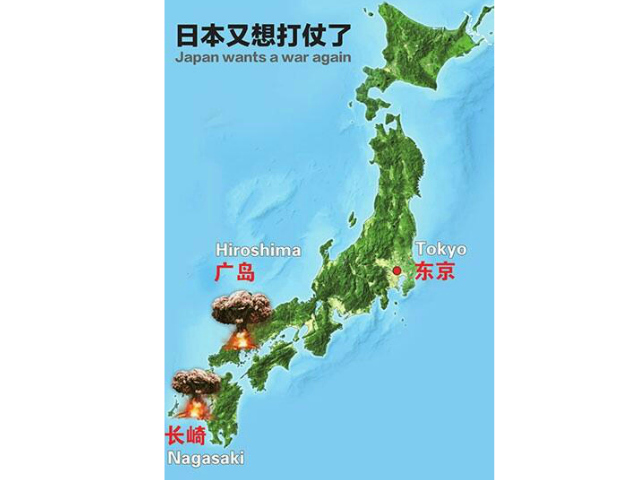
Japanese Foreign Minister Fumio Kishida spoke out publicly against a Chinese newspaper depicting a graphic of Japan with mushroom clouds over Hiroshima and Nagasaki and with the chyron “Japan wants a war again.”
The graphic appeared in the Chongqing Youth Daily, a newspaper affiliated with the communist party, and appeared to be protesting the decision by the Japanese government to expand its military ability beyond that currently permitted in its constitution from simply allowing attacks in response to an aggression to allowing attacks in defense of allies that have been attacked. The map of Japan appearing in the Chongqing paper only stated the one phrase but clearly depicted Hiroshima and Nagasaki under mushroom clouds.
“It is truly thoughtless to depict a mushroom cloud. As the foreign minister of the only country to suffer a nuclear attack and as a politician from Hiroshima, I cannot tolerate it,” Kishida responded to the illustration, telling media that Japan had lodged a protest with the paper and that “the editor-in-chief said that the Chongqing Youth Daily itself decided to publish the map in the newspaper” and not the Chinese government.
The New York Times notes that the map was not the only incendiary item in that issue of the paper. On another page, the newspaper asked, “Were we too friendly to Japan in the past?” The commentary there made it clear the paper was protesting the new permissions given to the Japanese military by its legislature. “As the ‘butcher’ of World War II, the blood on Japan’s hands has not yet dried. Lifting the ban on collective self-defense is tantamount to putting ‘a knife’ back in the ‘murderer’s’ hands,” it read.
The new doctrine of “collective self-defense,” which allows Japan to attack in defense of allied nations, has been extremely controversial both in China and Japan. In the latter nation, a man set himself on fire at a train station to protest the move; the man was hosed down by police and taken into custody.
Chinese state media has been wary of the move itself. In a speech this week commemorating wars against Japan, President Xi Jinping called it “a pity that a small minority of people still ignore iron-clad history and the fact that tens of millions of innocent people lost their lives in the war,” comments intended to mean that the Japanese move toward a stronger military was in itself a denial that Japan had ever committed wartime atrocities. Xinhua, a newspaper closely affiliated to the state, has been publishing a barrage of articles warning that an armed and able Japan is a threat to the entire region.
Japan is currently in a territorial dispute with China in the East China Sea, where both sides claim ownership of the uninhabited Senkaku Islands. President Obama stated this year on a visit to Japan that the islands were covered under a United States treaty with Japan, meaning the American government would be treaty bound to protect them should China choose to invade them.

COMMENTS
Please let us know if you're having issues with commenting.